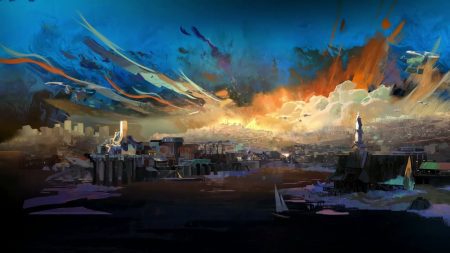After 90 episodes, eight OADs, and two specials, Attack on Titan has come to a close. The hit television series, adapted from Hajime Isayama’s hit manga, has dominated the anime zeitgeist for more than a decade. With 120 million manga copies sold and several 9.00+ scores atop the MyAnimeList charts, Attack on Titan (known in Japan as Shingeki no Kyojin) has cemented itself as a cultural behemoth.
Part of the appeal is its massive stakes. Much like Game of Thrones, Attack on Titan depicts a world of warring states, political maneuvering, and supernatural adversaries. Entire episodes are dedicated to unraveling the mysteries of the Titans: massive beings who broke through the walls of civilization and laid siege to humanity. In this world, anyone—no matter how skilled, tenured, or compassionate—can die at the hands of a titan at any time.
It’s that pull, the need to understand what the Titans are and how they were created, that kept anime watchers hooked and manga readers turning the page. Yet, halfway through the narrative, Isayama pulled a twist that uprooted the series and shifted the lens from survival-horror fiction to sobering reality.
In fact, the more I reflect on the Attack on Titan finale, the more I find its message a desperate plea—one that’s gone unanswered for far too long.
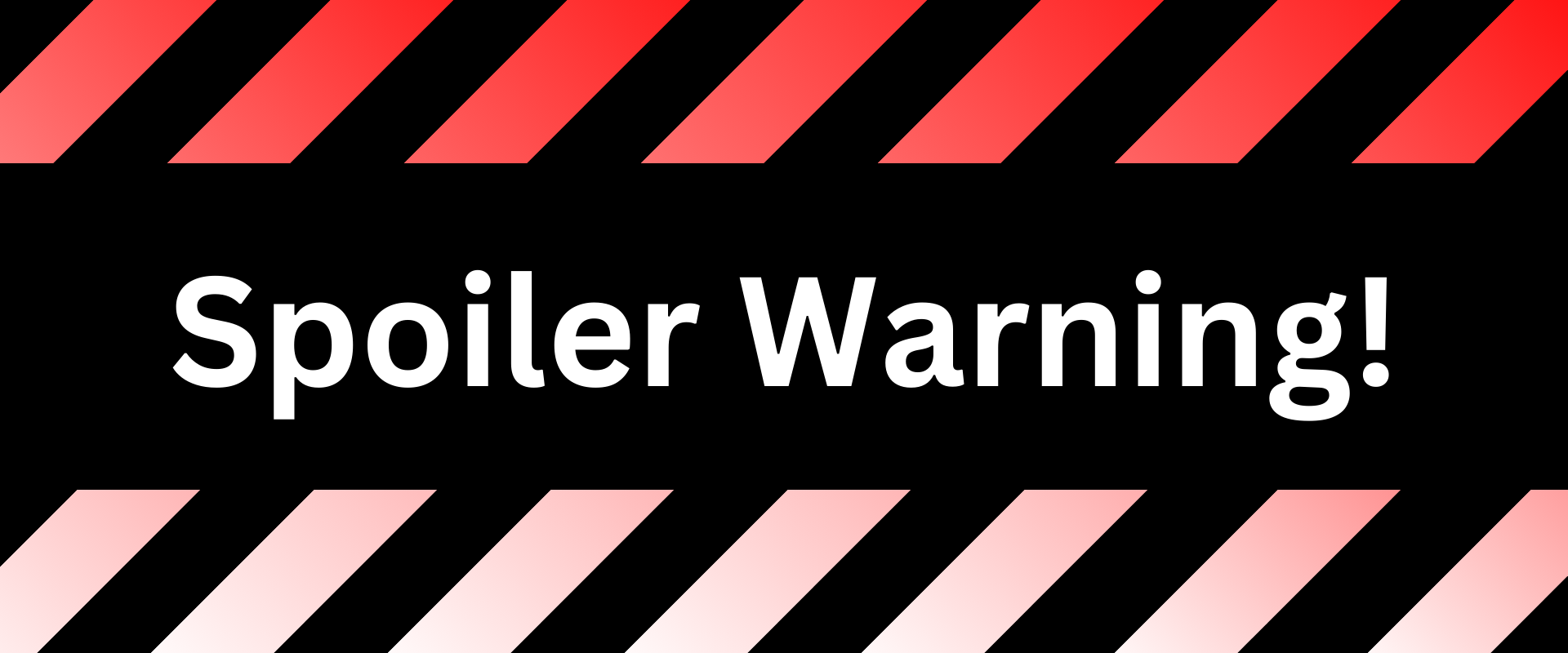
Seriously. If you haven’t watched or read Attack on Titan or its finale, I’m about to spoil everything. Bookmark this page and come back when you’re ready to read. No complaining once we go past the giant Titan picture.

“To You, 2,000 Years From Now”
If you’ve read or watched Attack on Titan, you know the story well.
Eren Yaeger, a young boy, wakes up under a tree after a long, deep dream. His childhood friend Mikasa, who’d nudged him awake, stresses that they should get back to the city. As she picks up some kindling she’d collected, she notices Eren has tears in his eyes.
Eren doesn’t understand why he’s crying, but the emotions soon come to a head. Upon reaching the city limits, he and Mikasa are greeted by Hannes, a member of the Garrison Regiment responsible for keeping the peace within the walls. To Eren’s dismay, Hannes has been drinking with his fellow Garrison soldiers. Enraged, Eren chastises them for neglecting their duties and warns of the possibility of a Titan attack.
Hannes assures Eren that the walls are 50 meters tall, the Titans haven’t attacked in 100 years, and the laziness from the Garrison is a sign of peace and safety. But Eren, frustrated and unconvinced, delivers a scathing retort: “That makes us just like cattle.”
Sure enough, the Titans do attack, the Garrison gets overwhelmed, and thousands of innocents within Wall Maria are killed—including Eren’s mother. This tragedy sparks a fire within Eren, spurring him to join the Survey Corps, travel beyond the walls, and find the freedom he so desperately seeks.
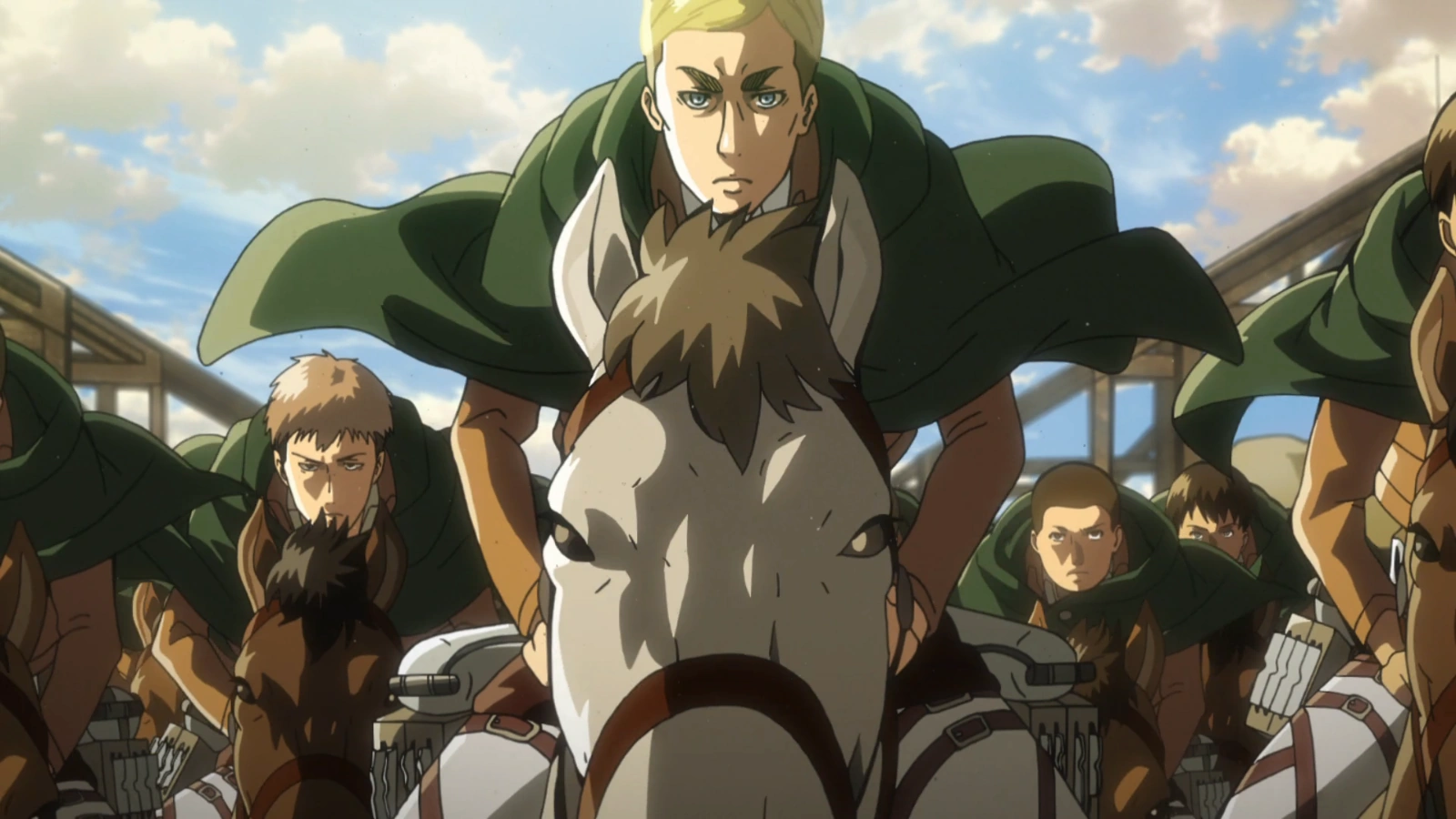
What Lies Beyond the Walls
For much of Attack on Titan, the narrative follows Eren, Mikasa, and their other good friend Armin as they train as Cadet Corps on the path to joining the Survey Corps. In the early going, death is frequent and indiscriminate. Good friends, from fellow cadet Marco Bodt to Hannes himself, end up falling at the hands of the Titans. Eventually, though, Eren and his friends discover the secret behind humanity’s shared fate.
Isayama’s grand twist? Humanity doesn’t actually have a shared fate at all.
For decades, the people living within the walls have been confined to the walls—not by the Titans, but by their own monarchy. A century ago, Karl Fritz cordoned off his kingdom, Eldia, from the rest of the world, ashamed of his people’s power. Turns out, Eldians are the Titans, and they’ve wielded that power against the rest of the world for thousands of years.
When Fritz isolated his people and built the walls of Paradis, he did so wishing to break the cycle of violence that had followed his people like a shadow. Meanwhile, the rest of humanity—namely, the kingdom of Marley and other global powers—lived free across the sea and enjoyed a far superior quality of life.
Air travel, motion pictures, local festivals… Marleyans may have been suppressed years prior, but they quickly outpaced any rudimentary technology or infrastructure available to the Eldians. Today, Marleyan children are raised to fear their Eldian counterparts and view them as demons. And while some Eldians are allowed to live in Marley, they do so wearing a bright armband—proof of their sins.
In short: Eldians, who had zero knowledge of their ancestors’ transgressions, were caged. As Eren so strongly asserted in episode one, they had become cattle. The only difference between his assessment and reality was that the walls weren’t meant to keep the Titans out—they were meant to keep Eldians in.
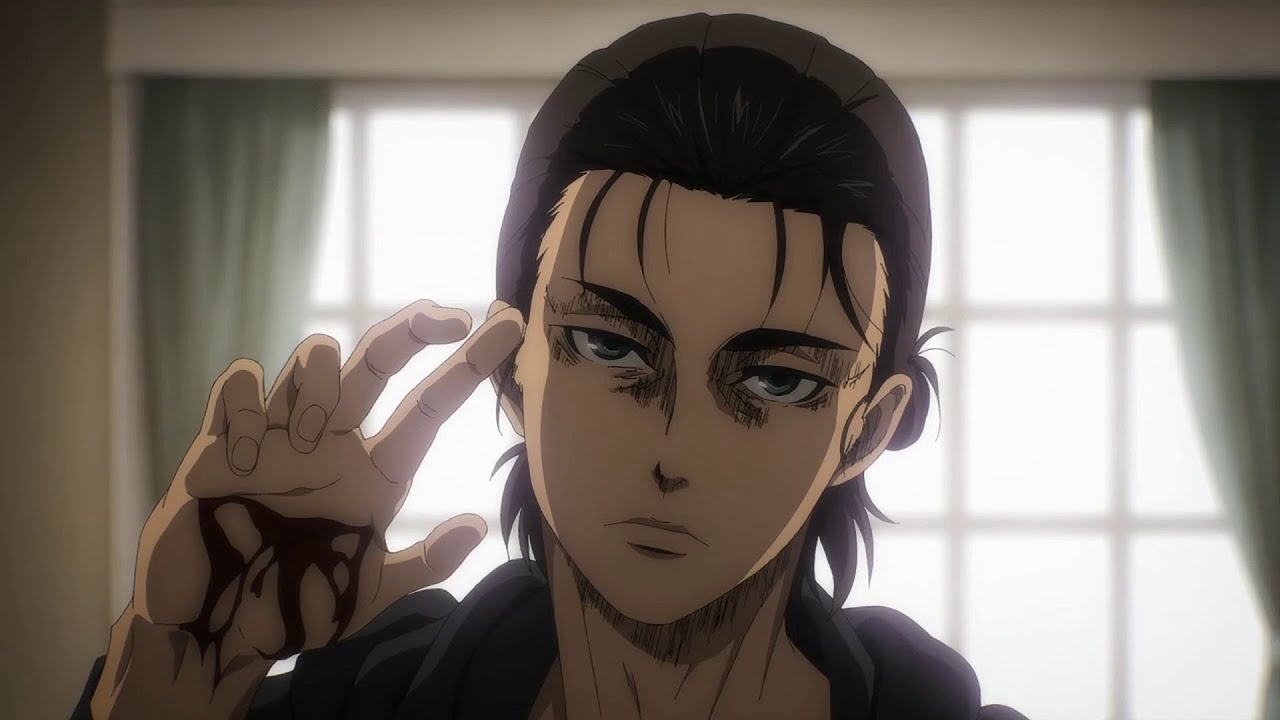
Continuing the Cycle
Even with its advanced military and technological might, Marley had struggled to keep ahead of rival powers. So, nearly 100 years to the date of Eldia’s self-imposed isolation, Marley orchestrated an attack on Paradis in pursuit of the Founding Titan, which holds the power to control all Titans. And though Marley’s troops didn’t know it at the time, that Founding Titan had come to reside within Eren.
Fast forward several years. Eren, having learned of Marley’s existence during his time in the Survey Corps, has become radicalized. Where he once believed that beyond the sea lies freedom, he now realizes that beyond lies his aggressors. Instead of searching for freedom, he’s resolved to “eliminate the enemy” and take it.
These events culminate in Attack on Titan’s Final Chapter, where Eren orders a horde of Colossal Titans to trample the Earth and wipe out all non-Eldian life. Ultimately, Mikasa, Armin, and the rest of the Survey Corps are able to cease the so-called Rumbling, but not before Eren reveals that he’s killed 80% of all life outside of Paradis.
One man, caged his entire childhood, wished to find freedom for his people. When he was wronged, he decided to strike back a thousandfold. Millions of dead men, women, and children later, and what does he—or the world—have to show for it? In the epilogue of Attack on Titan, Isayama offers an answer:
Generations later, long after Eren is gone, the island of Paradis is eradicated by a nuclear weapon.
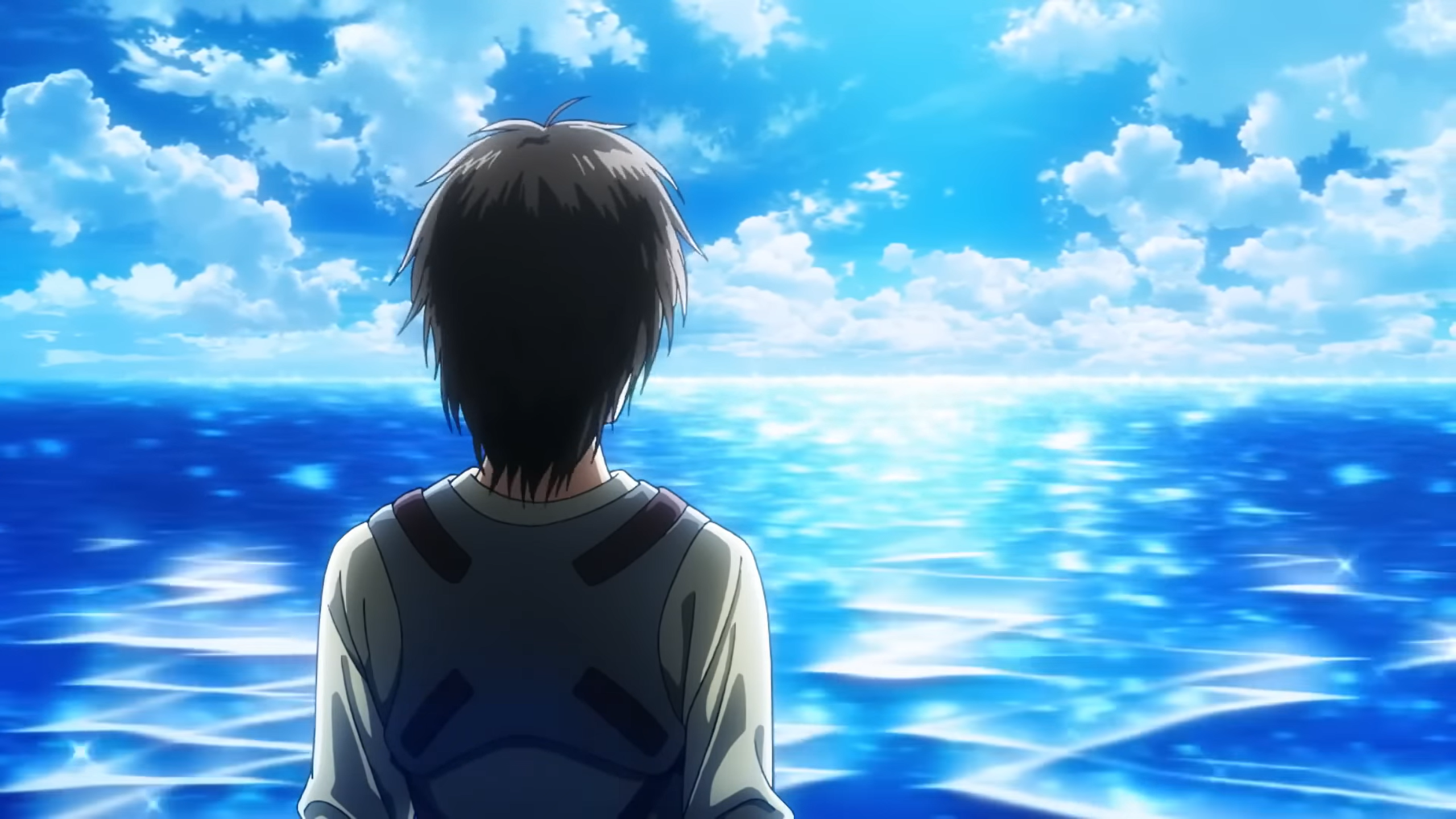
From Wall Maria to the Sea (and Beyond)
I’m 1,000 words into this piece, and I haven’t made any commentary up to this point. That’s by design.
I’ve summarized the story of Attack on Titan as best as I could without regurgitating the entire manga or anime. I left out some of the finer points: There are Yaegerists who follow Eren and treat him as a god. He has a half-brother who aims to resolve the conflict by euthanizing all Eldians. Eren can also see the past and future… which is confusing and only dilutes the point of the plot.
But I told the major beats exactly as they are. And if you remove all the Titan fights and time travel and 3D maneuver gear and typical anime tropes, there is a very real point to this plot. It’s painfully obvious how much Eren’s actions mirror today’s world, and it feels like cowardice not to state the parallels.
Where do we start?
One side, feared by another for past acts of violence, is put in a cage. Its people live fractured lives and face their own fear of the outside world. Over time, resentment builds and certain individuals become radicalized, only fueling more violence.
Or, from the other angle: A previously oppressed nation, seeking safe haven, gains military might. In the process, it begins to suppress another minority group. They put the individuals into crowded camps and force them to wear a scarlet letter. On paper, the two groups have the same rights, but the reality paints a different picture.
Or, yet another: One side suffers a devastating loss of life. Rather than de-escalate the conflict or explore opportunities for peace, they wipe out the vast majority of the opposing side because there “are no other options.”
I’ve spoken to Attack on Titan fans on both sides of the Eren debate. Some view his actions as heinous; others view them as justified. As for Isayama, he altered the anime adaptation to address a controversial line from Armin that thanked Eren for committing genocide. Now, Armin and Eren promise to meet each other in hell—a rather telling indictment.
Making Up Our Own Minds
I’m not here to praise Isayama. The mangaka has faced criticism for his celebration of Japanese general Akiyama Yoshifuru, who committed countless anti-Korean atrocities, as well as for his supposed denial of the Nanjing Massacre. This is one occasion where I’m choosing to separate the art from the artist.
Instead, I’m here to talk with those who resonated with Attack on Titan. Whether you were moved by Eren’s fight for freedom, Erwin’s pursuit of truth, Armin’s unwavering moral compass, or Reiner’s redemption arc, there’s an underlying throughline—and that’s basic humanity.
Everyone deserves access to food, water, housing, and electricity. Everyone deserves an unbiased education. Everyone deserves the right to love another or speak their truth. And above all else, everyone deserves to be free.
Attack on Titan may be over, but its call for peace is everlasting. I hope you’ll advocate for peace in Israel and Gaza, too.
Want to support the ongoing humanitarian crisis in Gaza? Purchase the Games for Gaza bundle. All proceeds go to the Medical Aid For Palestinians.
David is the founder of The Punished Backlog. He has a problem finishing games he starts.
Just beat: Donkey Kong Bananza.
Working on: Hollow Knight: Silksong.
Can't wait for: Metroid Prime 4: Beyond.
Follow David on Twitter at @David_Silbert to keep up to date with all things The Punished Backlog.










